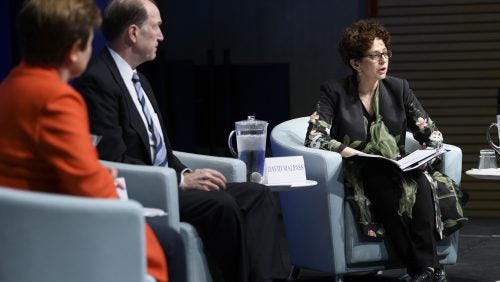COVID-19 Adds Urgency to Professors’ Work on Global Debt
May 12, 2020

Professor Anna Gelpern moderated a February panel between World Bank Group President David Malpass and IMF Managing Director Kristalina Georgieva.
The global economic meltdown caused by COVID-19 has redoubled two Georgetown Law professors’ commitment to address a long-simmering problem: massive and growing debt accumulation by many developing countries.
Access to new credit for low-income and emerging economy countries has quickly evaporated. This has turned a spotlight on the debt buildup and created another potential crisis, if countries must choose between food, medicine, and interest payments — or if dozens start defaulting on payments at the same time.

Visiting Professor Sean Hagan
“The COVID-19 crisis has catalyzed extraordinary economic intervention by governments at the national level. However, we have yet to see concerted international cooperation, including in the area of debt,” said Visiting Professor Sean Hagan, a former general counsel of the International Monetary Fund (IMF). “That is becoming increasingly urgent.”
His colleague, Professor Anna Gelpern, an authority on government debt and financial regulation, is more pessimistic. “The best-case long-term scenario is that this COVID-19 crisis jolts the international community into more ambitious sovereign debt management reforms, which would factor in the possibility of truly global shocks on the scale of the one we are seeing.”
“Do I think this is likely?” Gelpern added. “No. I suspect we will keep taking baby steps, there will be backsliding, and despite our best efforts, we will see messy defaults.”
Lawyers can help build the policy case and bolster political will for cooperation on debt management, and lawyers can also help translate economic policy ambitions into concrete institutional designs, Gelpern said. Before and during the pandemic-induced economic crisis, she and Hagan have been working on precisely that.
New urgency for Sovereign Debt Forum
The two professors were part of a group of legal scholars who launched the Sovereign Debt Forum at the IMF’s Washington headquarters in October 2019. The Forum is a collaboration among Georgetown’s Institute of International Economic Law (IIEL), Queen Mary University (London), and other U.S. and overseas institutions. Its activities include disseminating research on debt policy topics, such as risks at the intersection of debt management, public health, and financial stability, and helping train government officials from developing countries new to the international debt markets. Priority trainees also come from countries in or at risk of debt distress — a large and fast-growing set since the onset of the pandemic.
COVID-19 has forced the Sovereign Debt Forum to adapt its plans, while continuing its work with new urgency. Training sessions for debt managers in developing countries planned for mid-May in Paris, France, and later in Mauritius would be moving online, Gelpern said. The Forum will continue organizing Interdisciplinary Sovereign Debt Research and Management Conferences (DebtCons), with DebtCon4 still scheduled to take place at the European University Institute in September 2020. Gelpern is working with the European organizers on contingency plans for a hybrid-online format conference. IIEL hosted DebtCon3 in April 2019.
A world already swimming in debt

IMF Managing Director Kristalina Georgieva
Even before the pandemic, the IMF and World Bank Group were growing increasingly concerned about resurging sovereign debt. Gelpern was asked to moderate a Feb. 10 conversation on “Development and Debt in Lower-Income Countries” between World Bank Group President David Malpass and IMF Managing Director Kristalina Georgieva.
Last December, Gelpern also spoke at the launch of a World Bank publication tracing four major waves of global debt accumulation in the past 50 years. The first three ended in financial crisis in many low-income and emerging economies. The latest wave – starting in 2010 – has been the largest, fastest, and most broad-based increase in sovereign and corporate debt yet.
A world economy already swimming in debt was ill-equipped to deal with the shock of COVID-19. Before the pandemic, the IMF projected that the sovereign debt (both domestic and external) of developing countries would, on average, reach 56 percent of their GDP in 2020.
Hagan, an expert on international institutions, financial crises, and debt restructuring, says government and private borrowing on financial markets is a traditional way for developing countries to access the savings of wealthier countries. It is common practice for countries to then repay their debts by borrowing again. If they cannot borrow, they default, he said.
Therefore, the COVID-19 pandemic had epic bad timing: since it began shutting down parts of the global economy, loans to developing countries have stopped. The IMF has received requests for financial support from more than a hundred of its 189 member countries, some already experiencing difficulty in making their debt payments.
A call for burden sharing
The two Georgetown Law professors, also nonresident senior fellows at the Peter G. Peterson Institute for International Economics, co-authored an April 7 blog post with another colleague that advocates a broad-based debt suspension, and explains the coordination challenges it would entail among diverse private creditors, as well as between official and private, bilateral and multilateral lending institutions.
On April 15, the Group of 20 countries agreed to suspend all bilateral government loan repayments from low-income countries until the end of the year. Beneficiary countries must commit to using the relief to increase social, health, or economic spending to fight the pandemic. The G20 also called on private creditors “to participate in the initiative on comparable terms.”
“This is not a one-off issue, it is a systemic crisis,” Hagan said. “It is affecting a large portion of developing countries. That’s why there needs to be some burden sharing.”
Georgetown Law students seek solutions
The urgency to devise a way out of the impending debt crisis also is top of mind for some of Gelpern’s and Hagan’s students at Georgetown Law, which moved to online operations March 16 because of the pandemic.
Second-year student Beneva Davies-Nyandebo is one of Gelpern’s research assistants collaborating with a team of social scientists in the United States and Germany to determine whether some lenders systematically exact more onerous terms from developing country borrowers.
Raised in West Wareham, Mass., Davies-Nyandebo, 28, spent her childhood summers in Sierra Leone, where her parents are from. She worked one summer for Sierra Leone’s attorney general’s office, and also worked for private enterprises in China. Her current research focus on standard contract terms in government-to-government lending — terms such as “material adverse effect” and “act of God”—suddenly is very relevant, given the impending debt crisis, she said.
“If developing countries need to decide between their response to COVID-19 and their payments on loans, I assume that a conversation is taking place with lenders about these kinds of terms,” Davies-Nyandebo said.
Another of Gelpern’s research assistants, Leland Smith, is a third-year student who takes a course taught by Hagan about the resolution of past financial crises. Raised in Mystic, Conn., Smith, 34, is a West Point graduate who served in the U.S. Army in northern Iraq to help with reconstruction efforts after the war. He said that the COVID-19 economic crisis hasn’t slowed down his research, only increased its urgency.
“There’s a lot of research I’m doing that seems more important now, so that policymakers have the information that they need to make good policy decisions,” Smith said.